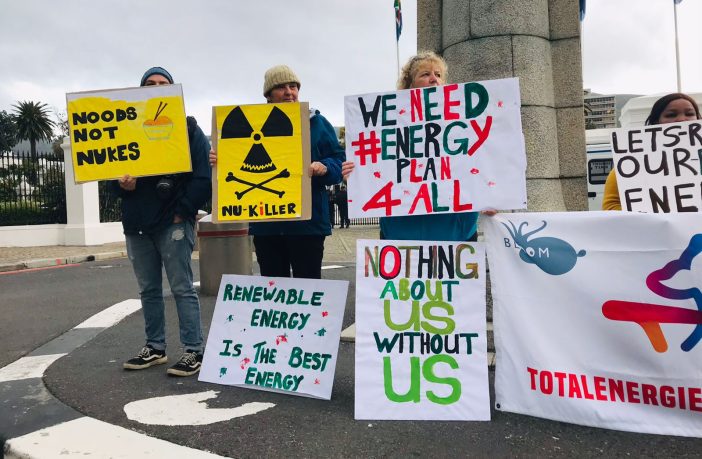- The Southern African Faith Communities’ Environment Institute (SAFCEI) and The Green Connection – joined by people of faith and NGOs, Oceans not oil and Project90by2030 – marked the beginning of Environment Month with their monthly vigil at Parliament.
- SAFCEI initially began vigils in 2015, to bring public awareness to the corrupt R1-trillion nuclear deal, which was a major threat to the economic future and wellbeing of the country at the time.
This year, the vigils have shifted gear. While it still continues to bring into focus the provision of safe and affordable energy, in the context of South Africa’s debilitating electricity crisis, SAFCEI and The Green Connection are now urging government to speed up addressing the root of the problem. South Africa urgently needs a proper and legally compliant Integrated Energy Plan (IEP), which takes into account the impacts on the environment, including the ocean, considers climate change, and does not pose additional risk to people’s livelihoods, and focuses on an inclusive economy, within ecological limits.
SAFCEI’s Executive Director Francesca de Gasparis says, “We are calling for an energy plan, the IEP, that works for all South Africans and for the cessation of all government’s nuclear, gas and coal plans – which cannot exist in a truly just energy transition. We have had enough of these false solutions that harm us all and violate the rights of already-marginalised communities. Going forward, there can be no room for harmful energy in South Africa’s energy mix.
We are concerned that, as a result of procrastinating on developing a proper energy plan, government continues to make decisions for a few not the majority, at a time when we can no longer afford it. With the Department of Mineral Resources and Energy’s (DMRE) voicing its ongoing commitment to fossil fuel and nuclear energy sources, it has demonstrated that it has become the major stumbling block to resolution of the current energy crisis or inclusive progress in our country, while ignoring the climate crisis.”
The Green Connection and SAFCEI launched legal proceedings in January 2023, to review the President’s failure or refusal to bring Section 6 of the National Energy Act (NEA) into operation. This is the part of the Act that requires that a proper Integrated Energy Plan (IEP) is developed for the country, in consultation with the public. On 28 April 2023, the President finally published his decision to bring Section 6 of the NEA into operation in the Government Gazette – however, that proclamation only provides for Section 6 to come into effect from 1 April 2024. This follows more than two (2) years of unsuccessful correspondence by The Green Connection, with the President and Ministry of Mineral Resources and Energy, and now requires nearly another year of waiting before this law comes into operation, and the legal obligation on the Government to develop and publish the IEP arises.
“In a recently published report, President Cyril Ramaphosa’s own advisory body, the Presidential Climate Commission (PCC), said that South Africa has no room for new coal and nuclear power in its energy mix. The commission’s unequivocal recommendation is that the ‘least-cost option’ – which includes 50 to 60 GW of renewable energy – is the way to go. We wholeheartedly agree with the commission that renewable energy, not coal or nuclear power, is the cheapest and most secure option, and with the shortest lead times.
This is what we need to make a meaningful impact on load shedding. However, as recently as the end of May, this year – and even with the release of the PCC report – the Minister of Mineral Resources and Energy Gwede Mantashe, has been adamant on forging ahead with nuclear energy. The PCC report puts further emphasis on the non-financial viability of coal and nuclear energy, stating that capital markets are ‘increasingly concerned about climate change and will not provide capital to industries which are not aligned with the climate transition’. It is decisions like these that make it even more painfully evident that we need a proper, inclusive plan,” says de Gasparis.
According to The Green Connection’s Strategic Lead Liziwe McDaid, “We are outside Parliament, because we want to raise awareness among our politicians that we need to stop, absolutely halt all oil and gas exploration off our coast. We urgently need a roadmap to tell us where we are going and how we will get the energy future that will serve the interests of not only this generation but also for those who are still to come. This means that we need to stop prioritising short term greed and focus on evidence-based, long-term sustainability.”
McDaid adds, “We hope that the Department of Mineral Resources and Energy, Presidency, and the Cabinet, will fast-track and prioritise the process to develop an IEP, in compliance with Section 6 of the National Energy Act (NEA). We believe in open, inclusive dialogue and finding constructive solutions in the public interest. Therefore, when we reflect on the severity of the energy and climate crises, we hope that President Ramaphosa will reconsider his position to only bring Section 6 into operation by next April (2024), which means that only then will government begin the process to develop a plan – or at the very least the Government must immediately prioritise the development work on the IEP, so that when Section 6 comes into operation they are in a position to publish it when Section 6 comes into operation, and after the public participation process required by Section 6. We also urge our government to approach this matter in the spirit of cooperation and human-interest, so that we can begin to work together to effectively and holistically address the most pressing crisis that continues to hurt our fellow South Africans.”
Author: Bryan Groenendaal
















1 Comment
Pingback: We must reject the government’s dirty energy plans - Vuka News